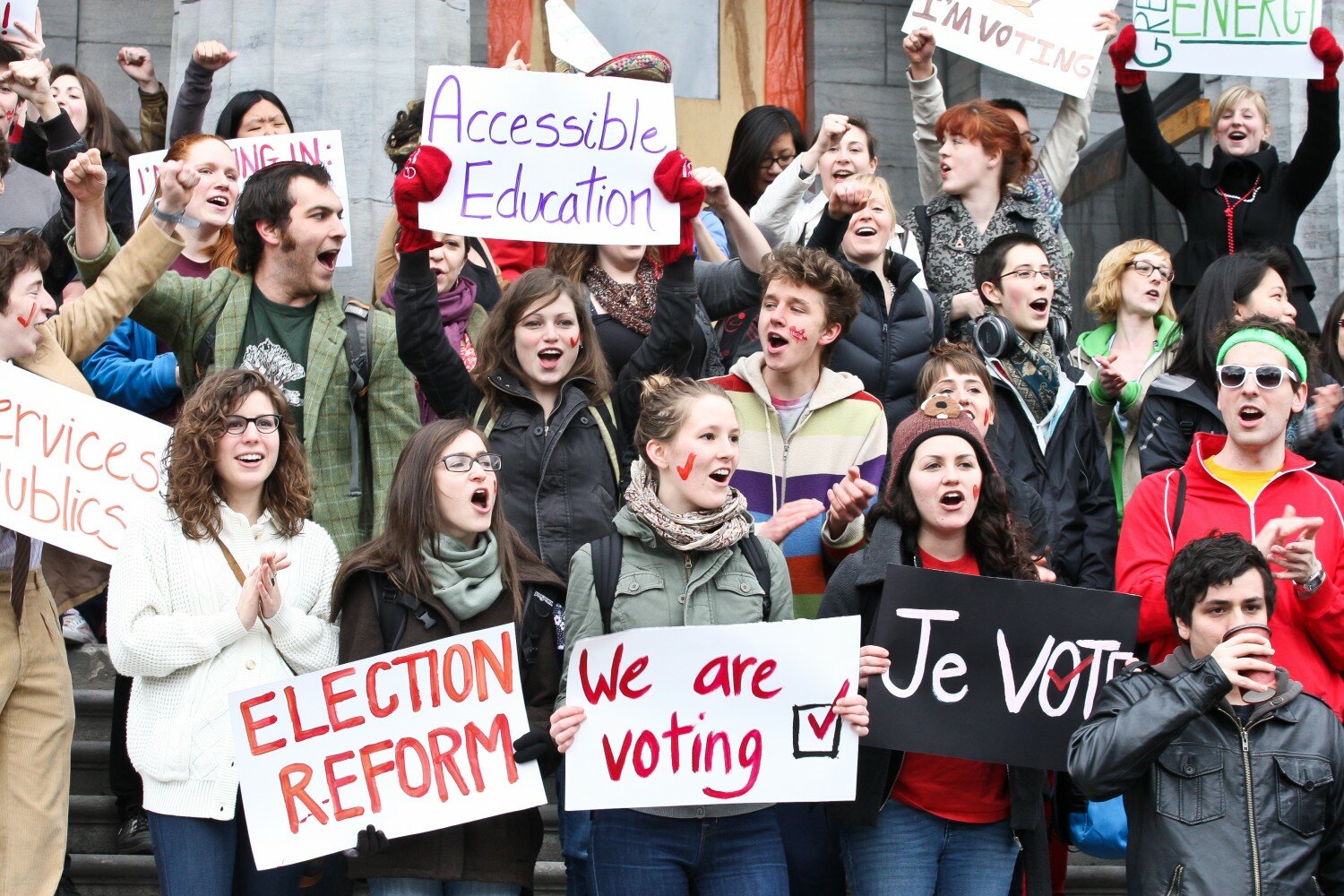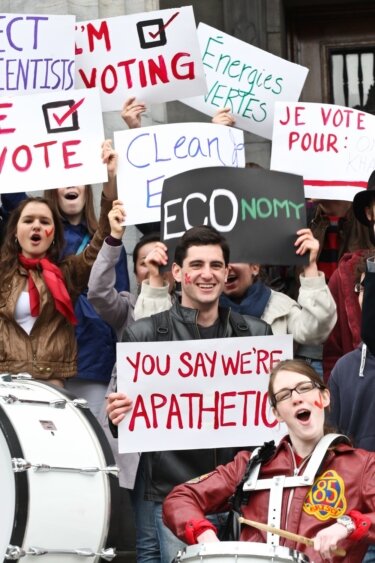How do we bridge the engagement gap?

Possible Canadas
What do you want Canada to be? This is the question 10 student journalists posed to their campus communities. They interviewed hundreds of students on 10 campuses, then produced in-depth investigations into how Canada could start to realize these visions. What did they learn? That despite all the stereotypes of disengaged millennials, young people have a lot to say about the future of our country. Explore the 10-part series from the Possible Canadas fellowship about how we, as a country, can get to that future.
Morgan Baskin was born into a family passionate about social justice. She grew up at protests and dinnertime conversation revolved around the environment, gender and sexuality. “I was not encouraged to get involved in electoral politics in a formal way, but it was a logical extension for me when I saw a problem in electoral politics,” says Baskin. “I wanted to solve it — that was how we treated problems with society in my family.”
Her determination led her to run for mayor of Toronto in 2014. At the time, Baskin was 18.
While she didn’t win the mayoral race, Baskin’s bold move was remarkable. As a young Canadian engaged on a day-to-day basis in the issues she cared about, she saw the electoral system as a vehicle for her to make change in her city and country. But by all accounts, Baskin is an anomaly among young Canadians.
According to Samara Canada, youth rates of civic participation outside of voting are 11 per cent higher than people in any other generation. Yet only 38.8 per cent of Canadians aged 18 to 24 voted in the 2011 federal election as opposed to 75.1 per cent of those aged 65 to 74. In short, as editor Tari Ajadi made clear in an earlier article, it’s not that youth aren’t engaged. They’re just not making the leap from engagement tovoting.The trend of youth voter disengagement persists across much of the developed world. According to the Economist, for example, in 2010 just 44 per cent of people aged 18 to 24 voted in Britain’s general election compared to 76 per cent of those aged 65 and over. The United States saw its lowest voter turnout ever in its 2014 midterm elections, where just 19.9 per cent of young people voted, compared to an overall turnout rate of 36.4 per cent. This trend tends to change, however, when charismatic politicians reach out to youth. According to Politico, Barack Obama would have lost the 2012 American presidential election without youth voting — overwhelmingly for him. Read more here.
Now a first-year student at Quest University Canada in Squamish, B.C., Baskin can reflect on her experience working inside a political system that only engages a minority of the youth population, and can understand why that gap between engagement and voting exists among young people. “Some [young] people have drunk the anti-millennial Kool-Aid, and just think [voting] is stupid,” Baskin recalls from her campaign. “Why would young people get involved in a system that’s not meant for them?”

According to Baskin, there’s an attitude among many young people that politics is “broken” and, more importantly, irrelevant to their daily lives. She says that using civic duty as a motivator for youth voting can “become a guilt trip [and] add to the negative impression of democracy.”
The experience of 20-year-old Rebecca Prior, who also lives in Squamish but does not attend university, is a perfect example of the barriers that face young Canadians when engaging in politics. Prior’s father sits on the Squamish City Council, and she was involved during his campaign and has helped him write various articles. She also works hard to keep up on provincial and federal politics, but recalls a distinct lack of outreach during this past election. Any local efforts to engage youth in the election, she said, were mostly focused on schools and the university. When local MP candidates attended the Squamish Farmers' Market to partake in a debate, Prior only found out after the fact from the woman who ran the farmers' market, despite the fact that she is so involved politically. The event was advertized in the newspaper and on the market's Facebook page, but neither of those are places that youth typically flock to for information. According to Statistics Canada, 46.5 per cent of Squamish’s population is under the age of 36. Many young people move to the town for its outdoor sports scene and are easily found at, say, the local outdoor sports store or the pub where rock climbers congregate. Why, Prior asks, weren’t they targeted?
When it came to election time, Prior herself was the one to get her friends out to vote. “A lot of my friends just voted for who I told them to, because they didn’t pay attention at all,” she says.
Prior’s story is one example of how representatives of our democratic institutions, like potential MPs, might allow otherwise engaged youth to fall through the cracks. According to the Broadbent Institute’s Millennium Dialogue report, 70 per cent of young Canadians believe that their views will be ignored by politicians.And why vote if you don’t think your vote will matter?According to Elections Canada, “people are less likely to cast a ballot if they feel they have no influence over government actions, do not feel voting is an essential civic act, or do not feel the election is competitive enough to make their votes matter to the outcome, either at the national or the local constituency level.” Read more here.
“A vicious cycle”
The fact that youth aren’t inspired to vote in Canada isn’t just a problem when they’re youth. A sustained pattern of youth voter disengagement could have a dangerous ripple effect on Canadian politics.
“If young Canadians don’t vote, research shows that we’re losing generations of voters for years to come because it’s habit-forming,” says Caro Loutfi, director of operations at Apathy is Boring, a nonpartisan and charitable organization aimed at increasing youth political engagement. In other words, statistics show that if you don’t vote when you’re young,you’re less likely to vote when you’re old."The generational effect is even larger than the life cycle effect. At the same age, turnout is three or four points lower among baby boomers than it was among pre-baby boomers, 10 points lower among generation X than it was among baby boomers, and another 10 points lower among the most recent generation than it was among generation X at the same age."
— An excerpt from "Why Was Turnout So Low?" in Anatomy of a Liberal Victory by Andre Blais, Elisabeth Gidengil, Richard Nadeau and Neil Nevitte.
Rock the Vote also published a Youth Voter Strategy Report in 2007 that compiled many scholarly findings on this subject. You can find that here.
“By not engaging first-time voters, we’re basically setting ourselves up for a failing democracy,” Loutfi continues. “If the overall trend of voter turnout for all Canadians keeps declining, in one generation we’ll have less than 50 per cent of the population show up to the polls on election day.” Loutfi says that such circumstances would put governmental policies into question because the government would become so drastically unrepresentative of the Canadian population. In short, the stakes for Canada are high.
“It’s a vicious cycle: youth don’t vote, therefore we don’t engage youth,” says Kaija Belfry-Munroe, a professor of Canadian politics at Quest University Canada.“It gets worse and worse and worse.”Belfry-Munroe suspects that youth disinterest has to do with political parties. "There’s been a lack of engagement one-on-one with people since the 1970s, and a greater focus on mass media and now things like social media," says Belfry-Munroe. "The other thing is that parties have become uncool," she continues, "and I think that getting excited about the election without parties is like getting excited about the World Series without the teams. If you weren’t excited about the Blue Jays, you would not be concerned about the World Series."
To extend this analogy, young Canadians currently aren’t even interested in baseball. What could work to change this would be getting other types of fans — soccer, golf, darts, you name it — engaged in baseball due to their passion for sports in general. Politically, this is the bridge that is missing for youth. The Blue Jays don’t matter if youth are removed from sports. Similarly, political parties and leaders have little relevance if youth are removed from electoral politics.
The antidote? According to Baskin, instead of separating other forms of community engagement from electoral engagement, youth need a reason to connect the two — like Baskin did and like Prior tried to do. Instead of trying to get youth to vote for the sake of voting, she says, politicians need to find a way to say, "'Hey, look at all of this stuff that you’re already doing. It’s great, it’s engagement, it’s political, so why don’t we add one more [aspect]: voting.'"
Bridging the gap
It’s not impossible. Some organizations are succeeding in creating a bridge that invites youth into electoral politics. What is important about these organizations is that they reach out to a wide range of youth. After all, besides inhabiting a common age range, the “youth” demographic is as diverse as any group of 5.5 million people can be.
One notable organization is CIVIX, a nonpartisan civic education charity. CIVIX reaches non-voting-aged youth through schools to teach students about politics in a way that provincial curricula typically do not. Student Vote, CIVIX’s mock-election program, runs in elementary and high schools during federal and provincial elections. Students have the opportunity to go through the process of learning about parties and platforms and actually casting a ballot.
This year, Student Vote ran in about half of all schools across Canada during the federal election. CIVIX provides lessons, videos, PowerPoint presentations and other learning tools and resources to teachers or principals who sign their school up for Student Vote.
One of the most valuable impacts of the Student Vote program, according to Dan Allan, CIVIX's research and communications manager, is the ripple effect it has beyond students — the converse of Loutfi’s dystopian scenario. “When we do our surveys of students and teachers [after the Student Vote program] we always hear that these students are going home and talking with their families about what they learned at school. Parents that weren’t going to vote beforehand are being inspired to vote,” says Allan. CIVIX’s surveys also showed that some students changed the way that their parents were going to vote by discussing the parties and platforms they learned about at school.
But CIVIX only reaches youth in elementary and high schools. Many other organizations go through college and university institutions, but the reality is that 40 per cent of youth in Canada are not enrolled in post-secondary education. If outreach is limited to educational institutions, it will naturally translate to a narrow understanding of youth issues.
As Ilona Dougherty, co-founder of Apathy is Boring, puts it, “The more educated tend to actually be more engaged.” In other words, focusing only on those youth who are engaged in higher education can lead to an echo chamber effect: engaged youth continually have opportunities to get more engaged, and unengaged youth become further removed.
To counter this, Apathy is Boring teams go to other places outside of traditional institutions where young people are potentially less engaged. They hit music festivals and concerts to talk to youth and get them pledging to vote. In this way, Dougherty says, engagement initiatives seem less didactic or forceful and more like a genuine conversation.

Measuring impact
During the 2013 B.C. provincial election, Apathy is Boring partnered with Elections BC to evaluate their outreach strategies. Street teams hit the music festival scene and spoke to over 10,000 young British Columbians. They could be registered to vote on the spot with registration forms that Elections BC provided. The forms were tagged with a code associated with the organization. Apathy is Boring uses hard data and storytelling as metrics for success. “You need those numbers, but we realized that it’s almost impossible to actually quantify a shift in someone’s behaviour and a shift in feelings with regard to civic belonging,” says Loutfi. Getting hard data, then, is only made possible through collaboration with other stakeholders.
After the election, Elections BC was able to pull that data and see the number of people that registered through Apathy is Boring. “We compared the difference between the people that we registered and their voter turnout rates with the provincial average and its turnout rates,” says Loutfi. The young people that Apathy is Boring registered ended up voting at a 17.5 per cent higher rate than the provincial average for that same age group.
Beyond the ballot
Besides giving young people an engaging election experience or a personal invitation to vote, Apathy is Boring and CIVIX converge on the importance of extending engagement beyond casting a ballot.
CIVIX runs other programs during non-election times. One of these programs is Rep Day, where schools are connected with a local MP or MLA for students to learn what their role is and how those politicians affect them directly. The street team for Apathy is Boring waited outside of polling stations after the most recent federal election to thank youth for making it to the ballot box, but also to remind them that their work wasn’t done.
“For us, in this election, for example, it [was so] important to make Oct. 20 just as important as Oct. 19,” says Loutfi.
Planned obsolescence
Organizations like CIVIX and Apathy is Boring recognize that they can still do more to help bridge the gap between community engagement and voting — perhaps through partnerships with organizations who aren’t focused on voter turnout, for example. Organizations like the YMCA or the Red Cross “have access to a lot of young people, and youth engagement affects every single cause,” notes Dougherty. “You could talk about environmental rights, human rights or whatever — if young people are engaging with their communities and their democracy, that’s going to have an impact on a whole bunch of different areas of interest across our country.”
But demonstrating to youth how their voting can lead to real action on the issues they care about cannot rest on the shoulders of organizations like CIVIX and Apathy is Boring alone. In fact, Loutfi says, youth engagement initiatives should be a short-term solution for the systemic makeover that must occur to reconnect youth and their communities with democracy. Eventually, she says, there should be no need for youth engagement organizations to exist.
What would this look like? Perhaps it will be Justin Trudeau who heads to the Squamish Valley Music Festival, or the cafeteria at Quest University Canada, or the next pipeline protest or documentary screening. He’ll talk to the youth in attendance about their local concerns, the momentum they’ve already created in their communities, and how Canada’s democratic system can support them further. This should be an issue relevant to Canada’s prime minister-designate, since he pledged to create a youth advisory council and involve young people in government.
To Mr. Trudeau, MPs, premiers, MLAs, mayors: we’re here, we’re engaged. Come find us where we are.
Possible Canadas is a partnership of diverse organizations that share the goal of supporting forward-looking conversations about the future of Canada. The project is produced by Discourse Media and Reos Partners, in collaboration with RECODE and the J.W. McConnell Family Foundation. Partners’ support does not imply endorsement of the views represented.
